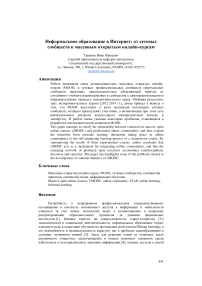Неформальное образование в интернет: от сетевых сообществ к массовым открытым онлайн-курсам
Автор: Травкин Иван Юрьевич
Журнал: Образовательные технологии и общество @journal-ifets
Статья в выпуске: 2 т.18, 2015 года.
Бесплатный доступ
Работа посвящена связи коннективистских массовых открытых онлайн-курсов (МООК) и сетевых профессиональных сообществ (виртуальных сообществ практики), предположительно объясняющей переход от стихийного учебного взаимодействия в сообществе к самоорганизующемуся образовательному процессу коннективистского курса. Обобщая результаты трех экспериментальных курсов (2012-2014 гг.), автор пришел к выводу о том, что МООК выступают в роли механизма интеграции сетевых сообществ, которым принадлежат участники, а возникающая при этом сеть распределенных ресурсов аккумулирует межпредметный дискурс и экспертизу. В работе также указаны некоторые проблемы, относящиеся к разработке последовательной дидактики МООК.
Массовые открытые онлайн-курсы, моок, сетевые сообщества, сообщества практики, онлайн-обучение, неформальное обучение
Короткий адрес: https://sciup.org/14062607
IDR: 14062607
Текст научной статьи Неформальное образование в интернет: от сетевых сообществ к массовым открытым онлайн-курсам
Потребность в непрерывном профессиональном совершенствовании, осознаваемая в контексте мгновенного доступа к информации и мобильности учащихся за счет новых технологий, ведет к возникновению и широкому распространению образовательных процессов за рамками формальных институтов [1]. Являясь ответом на «сверхсложность» (super-complexity [2]) экономической и социальной действительности, неформальное образование играет ключевую роль в концепции обучения на протяжении всей жизни (lifelong learning), а его нелинейность и индивидуальность адресуют нас к проблеме самообразования в условиях экономики знаний [3]. Здесь для решения одной из основных задач автономного учащегося, заключающейся в поиске значимых элементов среди избыточных и неупорядоченных массивов информации [4], помимо доступа к самой информации необходимо участие в дискурсе, позволяющем дать оценку содержащемуся в ней знанию [5]. Этим объясняется роль сетевых профессиональных сообществ, обучение в которых носит характер стихийного взаимодействия в процессе совместного осмысления опыта участников.
Важным результатом осмысления роли академического образования в свете появления открытых образовательных ресурсов (ООР) и развития «Веб 2.0» в первом десятилетии XXI в. стали массовые открытые онлайн-курсы (МООК) [6]. Первоначальные коннективистские МООК, — автор будет рассматривать именно этот тип курсов, — основаны на принципах самоорганизующихся сетей [7] и воплощают концепцию системы образования И. Иллича [8], которая служит трем целям: предоставить учащимся доступ ко всем необходимым ресурсам в любое время их жизни; помочь всем, кто желает делиться знаниями, находить тех, кто хотел бы у них учиться; сделать известным вопрос любого, кто захочет поделиться проблемой для публичного обсуждения [9]. Опираясь на высокий уровень самостоятельности учащихся, МООК относятся к неформальному образованию и имеют много общего с обучением в сообществах. Новаторство данных курсов сделало их долгожданным прорывом в педагогике ДО [10] и привлекло внимание большого числа исследователей сначала на Западе (см., например, [11] и [12]), а затем и на постсоветском пространстве (см. работы А. А. Андреева [10], В. Н. Кухаренко [13], К. Л. Бугайчука [14, 15] и др.).
Выбранная автором проблема — это связь коннективистских МООК и сетевых профессиональных сообществ, предположительно объясняющая переход от стихийного учебного взаимодействия в сообществе к самоорганизующемуся образовательному процессу курса. Задачей автора было установить содержание их очевидно тесной связи, избежав отождествления МООК со специальным типом сообществ. Результатом исследования стал следующий вывод: МООК представляют собой внешний механизм интеграции сетевых сообществ, при этом собственная роль МООК заключается в производстве сети распределенных ресурсов, содержащей межпредметный дискурс и экспертизу по избранным вопросам.
Методика исследования описана во втором разделе данной работы. Третий раздел посвящен теоретическим предпосылкам, а четвертый — анализу результатов экспериментальной работы. В пятом разделе изложен основной вывод: МООК как механизм интеграции сетевых сообществ. В заключительном разделе указаны некоторые направления для будущей работы.
Методика
В данной работе использован описательный метод кейс-стади, объектом которого стали три авторских курса: «(Об)учение в сети» (2012), «Сотрудничество, Самоорганизация и Образование в Открытом Мире» (2013) и «Сетевое сотрудничество и профессиональное развитие» (2014). Данные для количественного и качественного анализа были собраны с помощью электронного анкетирования (в конце курса), получены из блогов участников (статистика опубликованных записей и комментариев, анализ связей между пользователями, выборочный анализ содержания записей), Twitter (статистика сообщений с ключевым словом курса, анализ связей между сообщениями и участниками), а также из форм для записи на курс. Исследовательские вопросы были сформулированы на основе частных проблем, служивших исходным мотивом организации курсов как поисковых экспериментов автора.
Курсы были организованы в соответствии с принципами коннективистских МООК (см. пункт 3.4), при этом отличались относительно малыми продолжительностью (до двух с половиной недель) и количеством участников
( n < 200). Несмотря на малое фактическое число участников, допускалась неограниченная запись, и в этом смысле курсы можно назвать потенциальномассовыми. Автор принимал участие и как «организатор», и как «однокурсник».
Следуя принципу открытости МООК и рассматривая созданные участниками ресурсы как имеющие самостоятельную ценность, автор старался не анонимизировать участников, чьи свободно доступные ресурсы были использованы в анализе. Приведенные в работе ссылки помогут найти эти полезные материалы в сети Интернет.
Теоретические предпосылки
Открытые образовательные ресурсы
Возникновение открытых образовательных ресурсов (ООР) — колоссального количества цифровых и оцифрованных учебно-методических материалов в свободном доступе (и самого движения ООР), — является закономерным шагом в развитии всемирной сети Интернет. В документах ЮНЕСКО можно встретить следующее определение: «ООР являются содержанием (учебные курсы, учебники, планы проведения уроков, статьи и т.д.), а также инструментами (виртуальные лаборатории, симуляции, игры, исследования) и программным обеспечением, которые поддерживают практику обучения и образования. В зависимости от конкретных прав ООР являются бесплатными для всех с точки зрения доступа к ним, перезагрузки, совместного использования, перевода или иных изменений или использования» [16]. Особого внимания заслуживает возможность «переработки» ООР, т. е. неограниченного создания производных работ. Например, ООР позволяют преподавателям самостоятельно создавать учебные и методические пособия путем компиляции имеющихся в свободном доступе материалов. Не все ресурсы являются открытыми в данном смысле: например, в отношении западных OpenCourseWare и российских ЭОР (см., например, «Единое окно доступа к образовательным ресурсам», действуют правовые нормы, ограничивающие подобное использование.
В последние годы наблюдается заметный сдвиг в модели производства и использования ООР, заключающийся в переходе от производства ресурсов образовательными учреждениями и их повторного использования педагогами в практике преподавания к производству с участием энтузиастов и учащихся, а также индивидуальному использованию преимущественно в режиме онлайн (без загрузки). ООР, представленные медиа-объектами, подвергаются дроблению, что упрощает их организацию аннотированные подборки, которые мотивированные учащиеся составляют сами для себя и других (что можно рассматривать как вид учебной деятельности, а сами подборки — как вид производных ООР). В новой модели разница между ООР и ЭОР, связанная с правовыми аспектами использования, перестает быть критичной, поскольку все материалы хранятся на серверах правообладателей и не подвергаются непосредственному копированию или переработке.
Указанный сдвиг происходит в контексте развития студентоцентрированного образования в открытой образовательной среде, где учащиеся оказываются не столько в центре внимания педагогов, сколько в центре процессов производства знаний [17, 18]. Эта новая парадигма поддерживается рядом инноваций как в формальном, так и в неформальном образовании с использованием ИКТ.
В формальном образовании происходит внедрение гибридных форм организации учебного процесса, в частности, «перевернутого» (flipped) обучения. Просмотр учебных роликов в Интернет в качестве домашнего задания поощряет и опирается на использование ООР в индивидуальном порядке. Успех Khan Academy
связан не столько с возможностью эффективной организации обучения в классе, сколько с возникшим спросом на удобный формат ООР, позволяющий самостоятельно осваивать содержание образовательных программ в объеме, последовательности и темпе, отвечающим индивидуальным особенностям познавательного процесса. Ролики Khan Academy и аналогичных проектов (в т. ч. учительские ролики и ролики энтузиастов) часто хранятся на YouTube — в колоссальном и постоянно пополняемом хранилище видеороликов в общем доступе, где можно создавать собственные списки избранного и тематические «плейлисты», делая их доступными другим пользователям. Такие ООР адресованы в первую очередь учащимся, а их использование педагогами является, скорее, «побочным эффектом».
В неформальном образовании появление МООК сделало целенаправленное производство ООР учащимися, — взрослыми участниками коннективистских курсов, — ключевым видом учебной деятельности. Обучение, основанное на сетевых принципах, заключается в создании и публикации записей в блогах, конспектов и рефератов источников, подготовке переводов с различных языков, формулировании собственных заданий, описании учебных проектов, изложении нового опыта в инструкциях и практических руководствах, адресованных друг другу и всем пользователям Интернет. Что еще важнее, ООР становятся способом коммуникации участников образовательного процесса, превращаясь из контента в язык [7].
Веб 2.0 как персональная образовательная среда
Под Веб 2.0 понимают совокупность технологий, позволяющих посетителям веб-сайтов становиться авторами (соавторами) содержания, что отражает общую тенденцию развития Интернет в сторону социализации [19]. Содержание сайтов Веб 2.0 представлено медиа-объектами различных типов, а сами сайты, являющиеся инструментами для создания, хранения и модификации данных объектов, носят название сервисов. Обладая дидактическим потенциалом, сервисы Веб 2.0 находят применение в образовательных целях [20, 21]. Последнее создает предпосылки для развития сетевой модели образовательного процесса и пересмотра ключевых идей конструктивизма в новом технологическом контексте. Характерным атрибутом учащегося становится персональная образовательная среда (ПОС), т. е. такая инструментально-образовательная среда, которая выстраивается самим учащимся в контексте глобальной сети и позволяет лично управлять всеми используемыми и относящимися к нему сервисами и информацией (в противоположность виртуальным средам, создаваемым и администрируемым образовательными учреждениями); ПОС «подключена» к социальным сетям, базам знаний и доступным образовательным контекстам, в т. ч. к формальному обучению и обучению на рабочем месте [22].
ПОС интегрирует в первую очередь инструменты для создания и управления собственной учебной сетью, объединяющей людей и ресурсы, необходимые для удовлетворения познавательных интересов и потребностей учащегося [23]. Однако ПОС не просто библиотека «каналов», по которым поступают готовые знания, а персональное пространство для освоения и творческой переработки доступных ресурсов. При этом все, что учащийся преобразует и создает сам, становится содержанием Веб 2.0 и либо открыто сразу, либо может быть открыто для доступа другим пользователям. Важная особенность Веб 2.0 заключается в том, что обратная связь доступна не только посредством комментирования, но и в форме повторного использования, т. е. создания производных медиа-объектов — артефактов совместной практики. В результате познавательный процесс одних учащихся опирается на продукты познавательного процесса других учащихся (часто взаимно) и реализуется в конструктивной («конструирующей») критике и совместном творчестве. Последнее приводит к идее сообщества учащихся как генератора и носителя содержания, развиваемой идеологами ризоматического обучения [25].
Обучение в ПОС неформальное и требует устойчивой внутренней мотивации. Этот процесс можно описать с помощью усовершенствованной циклической модели Колба, рассматривая этапы анализа, рефлексии, обобщения и практики с т. з. производства содержания Веб 2.0. Цикл обучения предполагает создание и публикацию медиа-объектов — сообщений блога, презентаций, видеороликов, интерактивных схем и т. п., — отражающих процесс и результаты поиска предметных связей (приобретаемые знания) на основе предшествующего опыта. Обратной связью, необходимой для завершения текущего цикла и перехода к новому, служит отзыв пользователей глобальной сети [25].
Использование ПОС в специально организованном образовательном процессе можно регламентировать архитектурой участия. О'Рейли, предложивший изначально маркетинговый термин Веб 2.0, ввел также более общее понятие архитектуры участия для описания систем, развивающихся за счет вклада конечных пользователей [26]. В контексте изложенного понимания Веб 2.0 автор вводит то же понятие в узком смысле — как совокупность сценариев использования Веб 2.0 (сервисов определенного типа), позволяющих взаимодействовать в рамках общих целей путем активного производства медиа-объектов [27]. Здесь архитектура участия играет роль своеобразной «методики», адресованной одновременно всем участникам образовательного процесса (не только фасилитаторам). С точки зрения учащегося, обладающего значительной автономией в условиях сети, функция архитектуры участия заключается в настройке или «подключении» его ПОС к учебному контексту, развиваемому в рамках отдельного образовательного процесса.
Неформальное обучение в сетевых профессиональных сообществах
Под сетевыми профессиональными сообществами автор понимает виртуальные сообщества практики, т. е. неформальные группы пользователей Интернет, целенаправленно обменивающихся опытом, производящих и накапливающих знания посредством сервисов Веб 2.0 в процессе решения задач, относящихся к общей сфере интересов и профессиональной области [28]. Примером сетевых сообществ служат отечественные педагогические сообщества: «Педсовет» , «Сеть творческих учителей Intel Education Galaxy» , «Открытый класс» и др.
Исходное понятие сообщества практики было введено до появления Веб 2.0 и повсеместного распространения дистанционных форм сотрудничества. Лав и Венгер использовали его для разработки теории ситуативного обучения, утверждая, что профессионалы эффективнее учатся в социальном взаимодействии на рабочем месте, чем в традиционной учебной аудитории [29]. Сообщество практики, объединяющее сотрудников одного или нескольких предприятий (отрасли), рассматривается как обучающаяся социальная система и используется в качестве неформального учебного партнерства [30]. Участники такого партнерства сами несут ответственность за обучение, «носителем» и «программой» которого является легитимное (компетентное) участие [31].
Исследования показали, что отсутствие географической близости между пользователями Интернет не является серьезным ограничением для возникновения и развития виртуальных сообществ, как если бы сеть служила общей географической локацией [32]. При этом технология, опосредующая взаимодействие, обеспечивает преимущества и расширяет наши представление о сообществах, по мере того, как последние «обживают» новые виртуальные пространства [33]. Так, например, любое взаимодействие в сетевом сообществе может автоматически протоколироваться, что ведет к созданию полного цифрового «отпечатка» его истории.
Определяющими характеристиками сообществ практики, в т. ч. и сетевых сообществ, являются [34]:
-
• предметная область (domain), минимальная компетентность и вклад в которую является критерием участия;
-
• сообщество участников (community), определяемое регулярным и целенаправленным взаимодействием;
-
• практика (practice) или общий репертуар таких ресурсов, как опыт, инструменты, описания известных проблем, общие подходы к решению задач и т. п.
В сетевом сообществе ключевую роль играет овеществление (reification) опыта в артефактах. Венгер рассматривает овеществление наряду с самим участием как два самостоятельных, но тесно связанных аспекта, баланс которых определяет развитие сообщества практики [30, 35]. Сервисы Веб 2.0, как было показано выше, основаны на совместном производстве медиа-объектов, являющихся артефактами в смысле овеществления опыта и, что особенно важно, выполняющих функцию «катализатора» сотрудничества [32]. Например, в упомянутых выше педагогических сообществах артефактами являются учебные и методические материалы, публикуемые сетевыми коллегами, а также создаваемые совместно в режиме онлайн.
Свободный обмен знаниями и опытом в сообществах, где большинство участников незнакомы в реальной жизни, требует высокого уровня доверия [36], а также фасилитации в плане навыков и сценариев совместной работы в Веб 2.0 [33]. В связи с этим, рассматривая поддержку неформального обучения, автор выделяет два направления работы как наиболее общие и взаимодополняющие:
-
• создание места для обучения (learning place [37]) в осваиваемой сообществом виртуальной среде;
-
• участие контент-кураторов, реализующих модель трех функции преподавателя в неформальном контексте социальных медиа [38].
Первое направление адресовано проблеме доверия как части более общей проблематики. По мере развития дистанционного образования и мобильности учащихся, возникла обеспокоенность утратой университета как особого «социального» места, где встреча умов и обмен идеями происходят непосредственно, в полноте присутствия [39]. Как и с сообществами практики, было показано, что место для обучения можно воссоздать с помощью социальных медиа (Веб 2.0), причем именно социальное взаимодействие (студентов с преподавателем и студентов друг с другом) является ключом к погружению в дистанционный образовательный процесс, поддерживает неформальное обучение и позволяет выстроить доверие [37, 40]. Виртуальная среда на основе сервисов Веб 2.0 играет роль исходного пространства для размещения сообщества, и лишь конкретные социальные акты могут определить назначение данного пространства, сделав его местом для обучения [41]. Следовательно, создание места означает проектирование и реализацию социального взаимодействия, а не просто решение технической задачи (настройка инфраструктуры). В качестве инструмента для проектирования и реализации взаимодействия автор предлагает рассмотренную выше архитектуру участия.
Второе направление сосредоточено на поддержке активности контент-кураторов, т. е. экспертов, освещающих состояние определенной проблемы посредством регулярного поиска, организации и систематического представления ресурсов Веб 2.0 [42, 43]. В контексте сетевой модели знания (networked knowledge [44, 45]) деятельность куратора можно охарактеризовать как поиск новых предметных связей и раскрытие их содержания посредством достоверных и наиболее ценных ресурсов на фоне возрастания объемов доступной информации [46]. С точки зрения сообщества это означает постоянную осведомленность об актуальных ресурсах в Интернет, оценку ресурсов, производимых участниками, а также «синхронизацию» сообщества [47], необходимую для целенаправленного и плодотворного взаимодействия. Организационную роль контент-куратора можно объяснить на основе модели трех функций преподавателя в неформальном контексте социальных медиа [38, 48]. Беря за основу функции преподавателя, учтем следующее: контент-куратор не имеет в общем случае той непосредственной связи с формальным образовательным процессом, которую преподаватель использует в качестве контекста для отображения, поддержки и оценки взаимодействия. Тогда функциями контент-куратора в сообществе будут:
-
• создание предметного контекста: поток отбираемых куратором ресурсов создает необходимый содержательный контекст, служащий отправной точкой для остальных участников, а собственная активность куратора в сообществе является архитектурой участия «в действии» (демонстрация взаимодействия). Дополнительно куратор может располагать информацией о конференциях, семинарах и мастер-классах, выступать в роли их организатора и ведущего, быть редактором периодических изданий и т. п.;
-
• выявление достижений: осуществляется путем акцентирования наиболее значимых из производимых сообществом ресурсов, и, как следствие, их авторов (создание медиа-объектов рассматривается как овеществление опыта участников). Акцентирование ресурсов означает их включение в поток курируемого содержания вместе с кратким отзывом (одни и те же ресурсы могут включаться повторно);
-
• аккредитация достижений: куратор транслирует опыт сетевого сообщества в глобальную сеть, презентуя ресурсы выдающихся участников. Личный вес куратора как эксперта в своей области влияет на уровень доверия к отдельным (презентуемым) участникам и сообществу в целом. Участие куратора в конференциях и семинарах, работе экспертных советов, разработке стандартов и т. п. придает вес сообществу в более формальных контекстах.
Массовые открытые онлайн-курсы
Массовые открытые онлайн курсы можно охарактеризовать как смелый эксперимент в области дистанционного образования, начатый канадскими новаторами Дж. Сименсом, С. Даунсом, Д. Кормье, Б. Александером и их коллегами в 2008 году [49]. МООК основаны на активном вовлечении неограниченного числа участников (от сотен до тысяч) в самоорганизующийся дистанционный образовательный процесс, объединяющий взаимодействие в социальных медиа, обратную связь с экспертами, доступ и производство ООР. Такие курсы бесплатны и не предъявляют специальных требований к участникам (свободная запись). Наличие календарно-тематического плана — единственный внешний признак, роднящий МООК с традиционными курсами ДО [50].
Теоретическими предпосылками MOOC выступают принципы коннективизма — педагогической системы взглядов, развитой в работах Дж. Сименса и С. Даунса. Знание, составляющее основу нашей компетенции, рассматривается как динамичная сеть, образуемая связями между концептами, людьми, информационными ресурсами, компьютерами, нейронами мозга и другими «сущностями» (т. н. распределенное или сетевое знание). «Знать» значить «быть организованным» некоторым образом, иметь и быть включенным в определенную сетевую конфигурацию. Компетенция приобретается путем «подключения» связей, позволяющих распознавать вызовы окружающей среды и, используя ресурсы сети, надлежащим образом реагировать. Последнее означает также возможность действовать в условиях, когда необходимые знания не даны непосредственно, но могут быть актуализированы за счет активности связей [51, 52]. Анализ коннективизма отечественными исследователями выполнен в работах Е. С. Полат и А. Е. Петрова [53], С. Ф. Сергеева [54] и др.
Содержанием коннективистского курса является процесс создания курса как таковой — значительная часть учебных материалов предлагается или создается участниками по мере работы в Интернет [7]. Задача участников МООК заключается в поиске и представлении в форме новых ресурсов (т. н. артефактов осмысления [55]) предметных связей, т. е. в совместной разработке ключевых тем курса путем производства распределенного знания. Даунс выделяет четыре основных типа деятельности участника МООК [56]:
-
• агрегация (aggregation) — целенаправленное объединение содержания различных ресурсов и рассылок в единый информационный поток (с точки зрения учебно-методического обеспечения, МООК сам по себе оказывается таким потоком);
-
• ремикс (remixing) — организация содержания информационного потока на основе предметных связей и решаемых задач (например, составление списков ссылок по специальным вопросам);
-
• повторное использование (repurposing) — синтез или производство нового содержания на основе опосредуемого (например, составление схем и конспектов, перевод источников на другой язык и т. п.);
-
• распространение (feeding forward) — любые действия, направленные на распространение конечных и промежуточных результатов работы участника курса. Распространяемые результаты также оказываются в пространстве агрегируемых ресурсов и достигают других участников.
Особый интерес представляет третий тип, повторное использование, т. к. в его рамках возможен переход от работы с источниками и дискуссии к практической деятельности, опробованию «подключаемых» знаний. В качестве примера можно привести МООК «ds106» , участники которого разработали громадное число заданий на основе индивидуальной и совместной практики. К сожалению, рассматриваемые Даунсом типы деятельности дают лишь самое общее представление о том, как учатся активные участники, поскольку содержание необходимых аналитических и других навыков у него нераскрыто. Предполагается, что учащиеся владеют соответствующими мета-навыками, их выработка, по словам Даунса, не относится к числу задач МООК [57]. Рассматривая формирование связей на уровне психологического явления, т. е. собственное содержание учебной деятельности, Даунс обращается к кибернетическим моделям на основе искусственных нейронных сетей [52], что является отголоском ассоциативнорефлекторной теории, обращавшейся в подобных случаях к физиологии [58]. В результате психологический механизм остается нераскрытым, что заставляет коннективистов использовать объяснения из других теорий (см., например, [59]), а это, в свою очередь, затрудняет разработку последовательной дидактики МООК. В связи с этим некоторые авторы предлагают использовать культурно-историческую и деятельностную теории в качестве изначальной теоретической основы МООК [60].
Основная проблема данной работы заключается в соотношении МООК и сетевых сообществ. Чтобы коннективистский курс состоялся как самоорганизующийся образовательный процесс, необходимо сообщество активно взаимодействующих участников, что приводит некоторых исследователей к ошибочному отождествлению курса с сообществом как таковым [56]. Учебное сообщество участников МООК, — изначально простая совокупность записавшихся, — постепенно оформляется в социальную сеть, где выделяются кластеры или связанные между собой группы таким образом, что само сообщество образует сеть групп (в т. ч. со своими экспертами) [61]. Этапы возникновения данной структуры прослеживаются в рекомендациях отдельному участнику, т. е. «узлу» будущей сети, сформулированных Кормье [62]:
-
• ориентация (orient) — знакомство с календарно-тематическим планом, организация личных закладок для быстрой навигации, создание напоминаний;
-
• декларация (declare) — заявление себя как участника, создание или презентация персонального ресурса (например, блога) для работы в рамках курса;
-
• включение (network) — начало взаимодействия с другими участниками с целью установления отношений, включения в социальную сеть однокурсников;
-
• кластеризация (cluster) — объединение с избранными участниками для активного взаимодействия внутри группы (не исключая менее активное, эпизодическое взаимодействие с остальными);
-
• фокусирование (focus) — постановка собственных цели и задач в рамках курса, формулирование персонального результата и сосредоточение на его достижении.
Рассматривая данные этапы именно как рекомендации, легко заметить, что ведение блога, выбор группы, постановка собственных целей и т. п. — достаточно сложные задачи, что возвращает нас к обозначенной выше проблеме навыков. В этом смысле Кормье не столько дает рекомендации «новичкам» (тем, у кого нет опыта участия в МООК), сколько описывает самоорганизацию опытных участников. С точки зрения задачи объяснения механизмов становления и функционирования внутренней сети групп, данных этапов также недостаточно: здесь необходимо анализировать взаимодействие участников (как опытных, так и «новичков») в связи с архитектурой участия, которая, за исключением наиболее базовых сценариев, также находится в процессе становления.
Кейс-стади
Курс «(Об)учение в сети»
Летом 2012 года автор совместно с Ю. Ю. Травкиной, преподавателем Сахалинского колледжа искусств, организовали бесплатный МООК «(Об)учение в сети» , чтобы ответить на следующий вопрос: каким образом происходит самоорганизация дистанционных участников в условиях образовательного процесса без строго определенной программы, с избытком образовательных ресурсов, а также в отсутствие единой измеримой учебной цели, контрольных заданий и итоговой аттестации.
Курс длился две недели, с 20 июля по 3 августа 2012 года; дополнительная неделя была отведена для рефлексии участников (анализ и оценка собственного опыта участия в курсе). В программу вошли следующие темы-вопросы, каждому из которых был посвящен отдельный вебинар автора: сетевое обучение, новые грамотности, мобильный кампус, архитектура участия. Цель курса была сформулирована следующим образом: «актуализировав знания в ходе живой и рефлексивной дискуссии, отыскать среди точек пересечения идей и мыслей тот общий путь, некую схему, которая впоследствии позволит участникам лучше ориентироваться в актуальных направлениях электронной реформы образования».
Автор анонсировал курс в социальной сети Facebook за две недели до начала, а затем и в личном блоге. Анонс был доступен широкому кругу коллег организаторов (персональной учебной сети), которые, в свою очередь, распространили информацию о курсе на собственных ресурсах. Запись велась с помощью электронной почты, заявки принимались в свободной форме. Дополнительно был создан документ, доступный для редактирования любому пользователю Интернет, и где можно было записаться самостоятельно (документ использовался для решения ряда организационных вопросов, например, для выбора времени участия в вебинарах). Всего записались 49 человек, некоторые из них присоединились после начала курса. 30 участников создали персональные блоги (либо воспользовались существующими), при этом активными оставались 24 блога (более одной записи за время курса). В заключительной части курса 17 человек приняли участие во взаимной аккредитации (см. далее).
В вопросах непосредственной фасилитации организаторы опирались на опыт «горизонтального» обучения Peer 2 Peer University [63, 64], что сделало возможным и подвигло участников к организационной инициативе. В начале организаторы предложили поделиться ожиданиями от прохождения курса, сформулировав таким образом личную цель участия. Большинство их тех, кто вели блоги, описали собственные ожидания явным образом, что позволило им, по мнению автора, воспринимать себя подлинно причастными к событию курса (осознанная внутренняя мотивация). Организаторы, в свою очередь, также создали блоги и поделились ожиданиями, как если бы они были обычными участниками.
Активное участие предполагало посещение вебинаров, изучение и обсуждение предложенных источников, самостоятельный поиск дополнительных источников, ведение заметок и формулирование мыслей в персональных блогах, а также чтение и обсуждение записей в блогах однокурсников. Однокурсники самостоятельно детализировали предложенную архитектура участия, составляя и публикуя инструкций по использованию различных сервисов Веб 2.0. Например, поиск и презентация дополнительных ресурсов были организован с помощью экспериментального сервиса . Участники изначально не были знакомы с данным сервисом, а инструкция, предложенная автором, давала лишь самые общие представления о работы с ним. Наиболее активные приступили к освоению данного сервиса и в течение нескольких дней распространили свой опыт среди однокурсников. Аналогичная ситуация повторилась с сервисами для создания ментальных карт (использовались для разработки схем, быстрого конспектирования и систематизации ресурсов). Организаторы вели ежедневную рассылку по электронной почте, чтобы информировать участников об обновлениях и ценных материалах в блогах.
За время курса в персональных блогах были опубликованы 215 записей и 983 комментария (не считая записей и комментариев организаторов). Максимальное число записей и максимальное число комментариев, опубликованных отдельными участниками, достигли соответственно 20 (записей) и 115 (комментариев), а число записей и комментариев, опубликованных средними участниками (медиана), — соответственно 6 (записей) и 27 (комментариев). Распределения по количеству опубликованных записей и комментариев приведены на рисунках 1 и 2 соответственно.
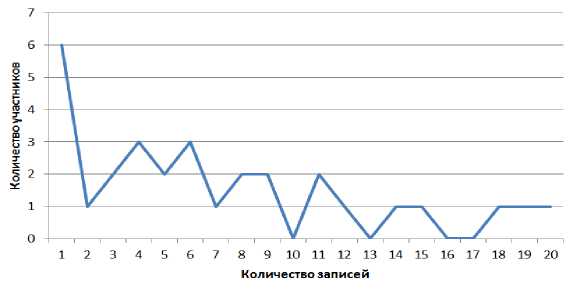
Рис. 1. Распределение участников по количеству записей в персональном блоге. Распределение составлено для участников, активных в персональных блогах (n = 30, не считая организаторов).
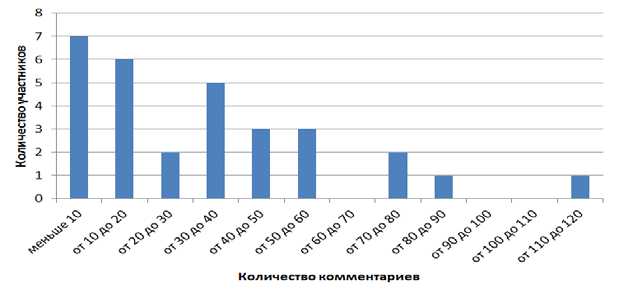
Рис. 2. Распределение участников по количеству опубликованных ими комментариев. Распределение составлено для участников, активных в персональных блогах ( n = 30, не считая организаторов)
Анализ комментариев в нескольких блогах со стабильно активным обсуждением (блоги С. Погребняка, О. Евстифеевой, Н. Люлькун и Н. Калиненко, Г. Можаева), позволил визуализировать фрагмент взаимодействия с участием 25 однокурсников (в т. ч. обоих организаторов). Был получен граф, отдельные вершины которого означают участников, их записи и комментарии (три типа вершин); связи между вершинами — это связи между записями и их авторами, либо между комментариями и их авторами, а также между комментариями и записями, к которым они были опубликованы (см. Рисунок 3). Визуализация с тремя типами вершин в противоположность графам, отображающим лишь участников, позволила рассмотреть принцип образования связей при работе в блогах. Кратчайший путь между любыми двумя участниками может быть двух типов:
-
• участник 1 ^ запись ^ комментарий ^ участник 2 ;
-
• участник 1 ^ комментарий 1 ^ (запись ( контекст ) ^) комментарий 2 ^ участник 2 .
Любой путь включает артефакты блогосферы, т. е. записи и комментарии, созданные участниками — эти артефакты служат содержанием тех связей, которые возникают между однокурсниками. Поскольку записи и комментарии в общедоступных блогах являются «единицами» ООР, становится понятным тезис Даунса о превращении ООР из просто контента (учебных материалов) в способ коммуникации (язык) [7].
Связность рассматриваемого графа зависит не только от вершин-артефактов, но и вершин-участников: если исключить соответствующие вершины, граф распадется на множество отдельных компонент, т. е. совокупность артефактов блогосферы не является связной сама по себе. Участник такой же элемент коннективистской сети (сетевого знания), как и производимые им информационные ресурсы, а сеть — самоорганизующаяся в том смысле, что возникает и развивается спонтанно, как результат взаимодействия участников.
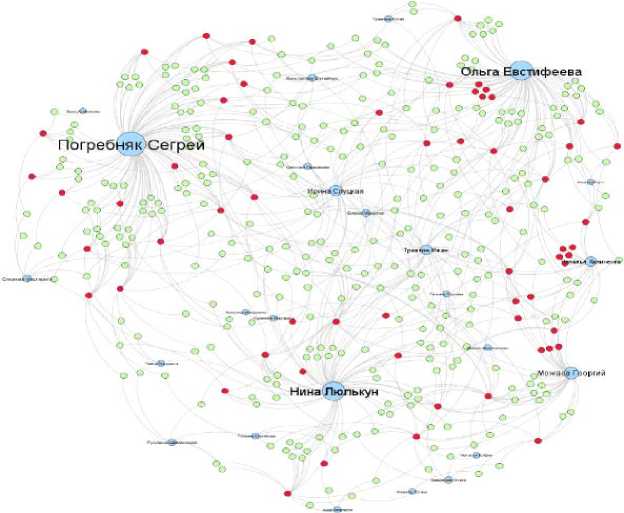
Рис. 3. Визуализация фрагмента дискуссии в блогосфере. Подписанные вершины (выделены синим цветом) означают участников (n = 25, в т. ч. два организатора; размер вершины пропорционален суммарной мощности — количеству связей). Вершины, выделенные красным цветом, означают записи в отобранных для анализа блогах (блоги С. Погребняка, О. Евстифеевой, Н. Люлькун и Н. Калиненко, Г. Можаева). Вершины, выделенные зеленым цветом, означают комментарии
Помимо блогов велась работа в социальной сети Edmodo , где была создана специальная группа (присоединились 36 участников, не считая организаторов). В группе публиковались ссылки на сообщения в блогах, а также дополнительные ресурсы. Используя встроенные функции «задания» и «журнал оценок», организаторы стимулировали активность. Задания служили напоминанием о предложенной архитектуре участия: предлагалось изучить источники по текущей теме и подготовить очередную запись в персональном блоге. Группа сохраняла активность в течение всего курса и после его окончания (сообщения продолжали поступать вплоть до начала 2013 года). Дополнительная активность наблюдалась в социальных сетях Twitter, Facebook и в прочих сервисах по инициативе самих участников.
Примером выраженной самоорганизации стало проведение двух незапланированных мероприятий — видеовстречи Google+ на первой неделе курса и дополнительного вебинара на второй неделе. Видеовстреча была организована по инициативе одной из участниц (Е. Микитюк), обратившейся к однокурсникам с просьбой поделиться опытом создания и ведения блогов. Второе мероприятие было посвящено созданию и использованию ментальных карт (инструмент организации умственного труда). Его организовали и провели другие две участницы (Н. А. Люлькун и Н. А. Калиненко), опубликовавшие также ряд полезных инструкций.
В заключительной части курса активным участникам была предложена неформальная форма подтверждения — взаимная аккредитация, — идею которой автор перенял у организаторов Peer 2 Peer University. Предлагалось составить коллективную благодарность, не имеющую юридического статуса диплома о прохождении лицензированных курсов. Предложение поддержали 17 участников (не считая организаторов), среди них: 7 педагогов средней и 7 педагогов высшей школы, сетевой методист, сотрудник библиотеки и руководитель центра ДО. Импровизированный «сертификат» был оформлен следующим образом: «Участники бесплатного неформального двухнедельного онлайн-курса «(Об)учение в сети» выражают друг другу благодарность за продуктивное сотрудничество в сети и взаимный вклад в неформальное повышение квалификации». На бланке были указаны имена участников и организаторов, адреса персональных блогов и отсканированные копии подписей.
В качестве обобщения изложенных результатов и ответа на исходный вопрос, автор пришел к следующему пониманию самоорганизующегося образовательного процесса, основанного на коннективистских принципах. Используя различные сервисы Веб 2.0, участники выстраивают персональные образовательные среды, отличающиеся набором сервисов, методами работы с ними и содержанием (индивидуально избираемые учебные ресурсы). Централизовано настраиваемая виртуальная образовательная среда отсутствует. Рекомендации организаторов и копирование опыта однокурсников позволяют выделить несколько основных сервисов (например, блоги и определенную социальную сеть), а очевидная архитектура участия — «синхронизировать» персональные образовательные среды, создав тем самым общее место для обучения. Работа по каждому из модулей программы сопровождается созданием новых ресурсов, фиксирующих результаты осмысления ключевых вопросов и практический опыт участников. Данные ресурсы служат также содержанием связей, возникающих в учебном сообществе курса, поскольку их публикация, обсуждение и совместная доработка являются способом взаимодействия. Таким образом, в результате взаимодействия однокурсников, происходит спонтанное формирование сети ресурсов, т. е. распределенного знания участников МООК. Фасилитация взаимодействия — первоочередная задача организаторов и важное условие самоорганизации в целом. Как и прочие функции организатора, фасилитация в значительной мере распределена: активные участники служат примером архитектуры участия «в действии», которая находится в непрерывном становлении, развиваясь из предложенных сценариев. Важной обязанностью организаторов является поддержание «пульса» МООК, например, посредством ежедневной рассылки.
Отдельного рассмотрения требует проблема «лурков» (от англ. «lurk» — «таиться»), т. е. проблема участников, которые числятся, не проявляя активности. Независимо от того, какой подход будет выбран для анализа данной проблемы, «лурки» находятся за рамками непосредственного участия, и любое суждение о них как об участниках изначально спекулятивно. Не исследуя данный вопрос специально, автор предпочитает рассматривать «затаившихся» как условных участников, моделирующих пользователей Интернет, которые будут иметь доступ и работать с материалами курса после его окончания.
Курс «Сотрудничество, Самоорганизация и Образование в Открытом Мире»
В начале 2013 года автор организовал бесплатный МООК «Сотрудничество, Самоорганизация и Образование в Открытом Мире» , чтобы исследовать возможность организации коннективистских курсов отдельными учащимися посредством их персональной учебной сети. Ключевая особенность курса состояла в использовании одних лишь ООР, т. е. в отсутствии авторских материалов, как если бы последний был просто контент-куратором.
Курс длился одну неделю, с 14 по 20 января 2013 года. Программа была сформирована на основе пяти докладов американской конференции TED , посвященных популярному изложению проблем открытости, сотрудничества и самоорганизации, их влиянию на образование, а также проблеме экспертизы (все видеоролики в свободном доступе). Целью курса было названо объединение людей, заинтересованных в обсуждении заявленной тематики — изучение докладов западных спикеров, формулирование вопросов и поиск ответов.
Анонс был опубликован за полтора месяца до начала в основном блоге автора, на сайте интернет-портала Педсовет , на сайте Ассоциации elearning специалистов «eLearningPRO» , в социальных сетях Twitter и Facebook. Участники предыдущего курса «(Об)учение в сети» получили приглашение по электронной почте. Авторы нескольких сайтов и рассылок образовательной тематики распространили анонс по собственной инициативе. Запись велась с помощью электронной формы для регистрации адресов электронной почты и сбора дополнительной (необязательной) информации о стране, городе и сфере деятельности участников, а также наличии регистрации в Twitter.
К началу курса общее число записавшихся составило 181 человек (по числу уникальных адресов электронной почты), позже записались еще 7 человек. Подавляющее большинство (92,6%) в качестве сферы своей деятельности указали образование (включая корпоративное обучение); отдельные участники назвали информационные технологии, библиотечное дело, психологию, математику, журналистику, страхование и управление проектами. Большинство (78,2%) подтвердили наличие регистрации в Twitter, при этом треть участников (30,3%) сообщили, что не используют свою учетную запись. Географическое распределение участников приведено на Рисунке 4.
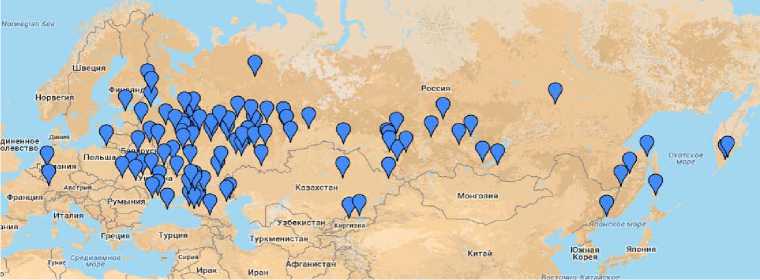
Рис. 4. География участников МООК «Сотрудничество, Самоорганизация и Образование в Открытом Мире»: 101 населенный пункт, указанный 185 (из 188) участниками при регистрации. (Изображение получено с помощью Карт Google.)
Участие в курсе предполагало просмотр докладов по одному видеоролику первые пять дней и их обсуждение в социальной сети Twitter. Автор использовал дополнительную учетную запись, ежедневно публикуя ссылки на доклады и вопросы для обсуждения. Последние два дня были отведены для свободной дискуссии без докладов и специальных вопросов. Каждая ссылка и каждый вопрос публиковались отдельными сообщениями, содержащими ключевое слово — «хештег» курса. Участники также использовали «хештег» в своих сообщениях, что позволило выделить их обсуждение из общего потока Twitter. Дополнительно автор использовал блог курса, где доклады (вместе с полным текстом) и вопросы к ним размещались в удобной последовательности. Там же располагался архив дискуссии в Twitter. Ежедневная рассылка по электронной почте дублировала сообщения блога.
За основу организации была выбрана технология «твитчат» [65]. Архитектура участия свелась к взаимодействию в Twitter, т. е. к минимуму для МООК (Twitter — один из основных инструментов агрегации в МООК). В то же время, предложенный сценарий позволил явным образом сформировать сеть однокурсников — участники становились «подписчиками» друг друга. При этом курс проходил в открытом пространстве социальной сети («умная комната» без виртуальных стен — незаписанные пользователи могли наблюдать и присоединяться к обсуждению); наиболее активные участники использовали дополнительные сервисы (персональные блоги и др.), публикуя соответствующие ссылки в Twitter.
Для анализа общей динамики, а также связей между участниками и их сообщениями, автор осуществил сбор всех сообщений, содержащих «хештег» курса, за период с 10.01.2013 (день, когда появились первые сообщения) по 21.01.2013 (через день после окончания курса). В выборку вошли 1760 сообщений от 118 участников (не считая автора), из которых 1595 были опубликованы во время курса. Динамика показана на Рисунке 5. Первые четыре дня курса (14.01.2013 - 17.01.2013) наблюдалась относительно высокая активность, на пятый день (18.01.2013) — средняя активность, последние два дня (19.01.2013-20.01.2013) — низкая активность.
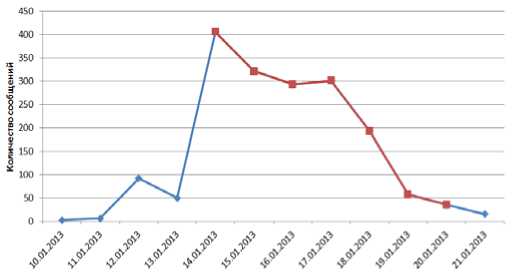
Рис. 5. Динамика сообщений по дням. Распределение составлено на основе выборки по «хештегу» курса в период с 10.01.2013 по 21.01.2013 (не считая сообщений автора)
Распределение участников (активных в Twitter) по числу сообщений имеет вид т. н. «длинного хвоста» (см. Рисунок 6): при максимуме 155 сообщений, количество сообщений от среднего участника равно 8,5 (медиана); больше половины всех сообщений (52,4%) опубликованы 18 наиболее активными участниками.
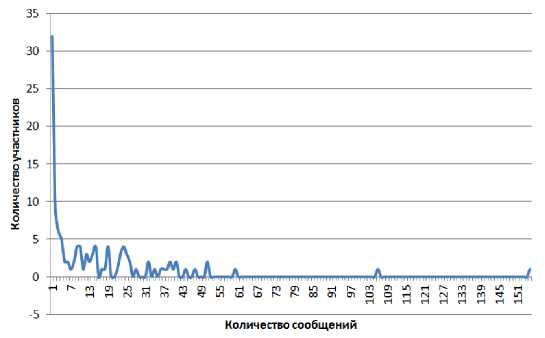
Рис. 6. Распределение участников по количеству сообщений в Twitter. Распределение составлено для участников, активных в Twitter ( n = 118, не считая автора)
На основе метаданных из сообщений в Twitter был получен граф дискуссии, вершины которого означают отдельные сообщения, а ребра — связи между исходными сообщениями и ответами. В отличие от форумов, позволяющих организовывать тематические обсуждения, Twitter устроен по принципу сплошного потока, затрудняющего продолжительные групповые обсуждения. Анализ связных компонент (отдельных групп соединенных вершин) позволил установить организующую роль вопросов, которые автор публиковал к каждому докладу: из этих вопросов как из «зерен» ежедневно вырастала новая сеть сообщений (см. Рисунок 7). Наблюдались также отдельные длинные цепочки, не связанные с вопросами автора, самостоятельные ветви дискуссии.
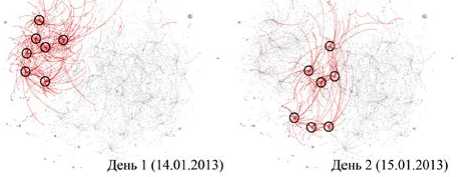
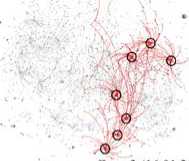
День 3 (16.01.2013)
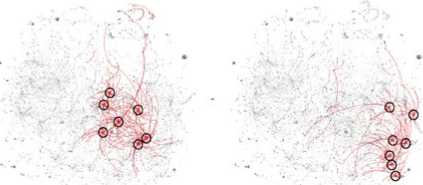
День4(17.01.2013)
День 5 (18.01.2013)
Рис. 7. Граф дискуссии в Twitter: выделены сообщения, опубликованные в каждый из первых пяти дней (14.01.2013 – 18.01.2013). Особо отмеченные вершины означают сообщения с вопросами организатора
После окончания курса автор организовал рассылку анкеты, на которую ответили 73 анонимных респондента. На вопрос об уровне участия (см. Таблицу 1) больше половины респондентов сообщили, что смотрели доклады и участвовали в дискуссии (66%), еще почти треть смотрели доклады и читали дискуссию (27%).
Таблица 1.Распределение респондентов анкеты по уровням участия в курсе
Уровень участия n просмотр докладов (только) 2 (3%)
просмотр докладов и чтение дискуссии 20 (27%)
просмотр докладов и участие в дискуссии 48 (66%)
чтение дискуссии без просмотра докладов 2 (3%)
участие в дискуссии без просмотра докладов 0 (0%)
ничего не делал 1 (1%)
Примечание: n = число респондентов, выбравших соответствующий вариант; всего респондентов: 73.
Анкетирование показало, что 40% респондентов не имели опыта работы в Twitter и начали использовать его во время курса, 20,5% — использовали меньше года, 41,1% — год и больше. Один респондент ответил, что не использовал Twitter раньше и не начал использовать его во время курса (см. Рисунок 8). Большинство назвали предложенный способ участия простым или «скорее простым» (вместе: 68,5%), почти треть — «скорее сложным» (28,8%), и лишь 2 респондента — сложным (2,7%) (см. Рисунок 9). У большинства не возникло проблем при чтении ответов однокурсников (67,1%), а также при публикации собственных ответов (71,2%) в Twitter (см. Рисунок 10).
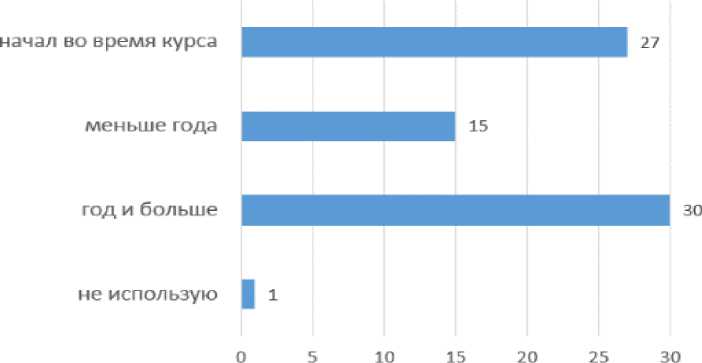
Рис. 8. Распределение ответов на вопрос о том, как давно респонденты используют Twitter ( n = 73)
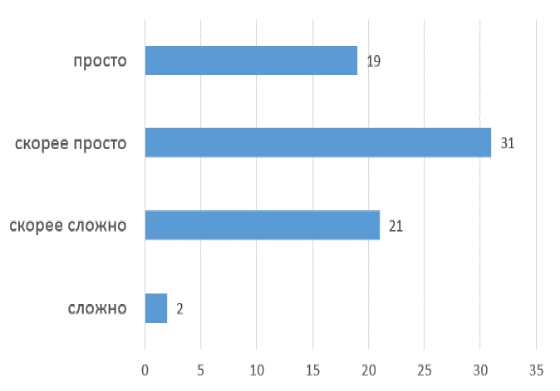
Рис. 9. Распределение ответов на вопрос о том, насколько сложен (по мнению респондентов) предложенный способ участия ( n = 73)
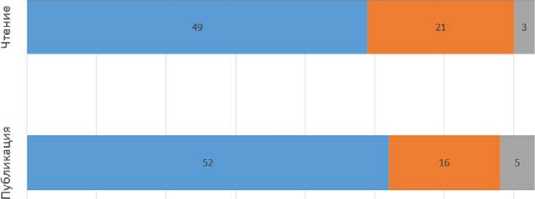
О 10 20 30 40 SO 60 70 80
■ не вызывало затруднений ■ вызывало затруднения ■ не пробовал
Рис. 10. Распределение ответов на вопросы о наличии трудностей при чтении (вверху) и публикации (внизу) ответов в Twitter (n = 73)
Анализ ответов на открытые вопросы показал следующее (см. Таблицу 2). На вопрос о пользе участия 60 из 73 респондентов дали ответы, подтверждающий пользу самого курса. В развернутых ответах были установлены следующие варианты: ознакомился с новыми идеями, появились собственные интересные мысли (12 ответов); опробовал новый способ взаимодействия — Twitter (9 ответов); узнал мнением коллег по ключевым вопросам курса (8 ответов); посмотрел доклады, которые могут быть полезны в собственной работе (7 ответов); приобрел новые контакты (5 ответов); сформулировал собственные мысли (5 ответов); научился краткому тезисному изложению в формате сообщений Twitter (2 ответа). Делясь замечаниями в последнем вопросе анкеты, респонденты отметили: неподходящий формат курса (20 ответов); ограниченность Twitter — радикально короткая длинна сообщений, отсутствие инструментов организации и навигации в обсуждениях (13 ответов); мало времени (8 ответов); особое положение организатора — формулировал вопросы, на которые сам не отвечал (3 ответа); отсутствие ясной цели (2 ответа); отсутствие практики (1 ответ); отсутствие выводов (1 ответ).
Таблица 2.
Результаты анализа открытых вопросов анкеты.
|
Польза от участия |
n |
|
ознакомился с новыми идеями, появились интересные мысли опробовал новый способ взаимодействия (Twitter) ознакомился с мнением коллег посмотрел интересные доклады (полезные материалы) приобрел новые контакты сформулировал собственные мысли научился краткому тезисному изложению (в формате Twitter) |
12 9 8 7 5 5 2 |
|
Замечания |
n |
|
неподходящий формат курса ограниченность Twitter мало времени особое положение организатора отсутствие ясной цели отсутствие практики отсутствие выводов |
20 13 8 3 2 1 1 |
Примечание: n = частота соответствующих вариантов, установленных в ответах респондентов; всего респондентов: 73.
Участвуя в курсе, автор моделировал деятельность эксперта-куратора, имевшего преимущество составителя программы, однако вовсе не ограничивавшего инициативу однокурсников, ставших его персональной учебной сетью. Следуя предположению о том, что в роли организатора может выступать учащийся с развитой персональной сетью и навыками опытного участника МООК (см. основные типы деятельности по Даунсу в пункте 3.4), автор сосредоточился на том необходимом и достаточном минимуме организации, который может быть инициативой отдельного учащегося. Главной задачей стало создание «умной комнаты» (метафора Д. Вайнбергера [45]), т. е. сети однокурсников, использующих потенциал уникальных внешних связей для осмысления и развития объединяющих их идей. Сначала необходимо было создать проблемный контекст в персональной сети куратора, а затем сфокусировать и удерживать внимание участников данной сети. Основой контекста служили доклады, а для его актуализации и, одновременно, фокусирования внимания, автор использовал вопросы. Сопровождение ресурсов вопросами можно рассматривать как один из приемов контент-кураторства. Вопросы указывают на те связи, которые куратор хочет выделить, однако сам не делает этого, провоцируя участников. Участники, в свою очередь, обнаруживают новые связи, а не просто заполняют «пробелы», оставленные куратором. Рассмотренные выше результаты подтверждают условную эффективность данного приема с учетом специфики Twitter — организованное взаимодействие посредством собственных сообщений участников затруднено в сравнении с пассивным чтением и примитивным копированием («ретвитом») чужих сообщений. Несмотря на ряд нерешенных проблем, о чем свидетельствуют замечания респондентов, была показана принципиальная возможность организации коннективисткого курса отдельным учащимся. С точки зрения организационных условий, автономный учащийся, т. е. тот, кто в полной мере реализующий четыре основных типа деятельности участника МООК, — это очаг самоорганизации. Очевидно, что для полноценного опыта необходимо наличие нескольких очагов, действующих параллельно или сменяющих друг друга по мере необходимости.
Курс «Сетевое сотрудничество и профессиональное развитие»
Летом 2014 года автор организовал бесплатный МООК «Сетевое сотрудничество и профессиональное развитие» , чтобы на конкретном примере изучить механизм раскрытия предметного содержания в условиях самоорганизующегося образовательного процесса. Основной предпосылкой стало убеждение, основанное на опыте участия в западных МООК («LAK11» , «mobiMOOK» a+MobiMOOC+hello%21 и др.): программа коннективистского курса рассчитана на актуализацию основных теоретических сведений, используемых участниками для совместной реконструкции систематического изложения.
Курс длился две с половиной недели, с 14 по 30 июля 2014 года. В программу вошли четыре вопроса-модуля: коннективистская организация, персональная профессиональная сеть, интерактивное портфолио, система ценностей и доверие в сети. Модули состояли из докладов автора и приглашенного эксперта, списка ресурсов для изучения (статьи, записи в блогах, видеоролики), а также вопросов для размышления. Курс был заявлен как дискуссия в формате МООК с целью совместной рефлексии вопросов и путей организации профессионального развития посредством сотрудничества в сети Интернет.
Анонс курса был опубликован за два месяца в персональном блоге автора, а также в социальных сетях Twitter и Facebook. Автор разместил анонс в нескольких группах Facebook, посвященных электронному и дистанционному обучению, пригласив тем самым широкий круг коллег из России и стран СНГ. Также информация о курсе была размещена в дополнительном блоге на интернет-портале Педсовет и скопирована на другие ресурсы по инициативе их авторов. Запись участников велась по адресу электронной почты, которые необходимо было ввести в специальную форму. К началу курса автор принял 138 заявок (по числу уникальных адресов электронной почты), а затем поступили еще 8 заявок.
Организация курса практически не отличалась от подобных МООК. Единственной разницей стала замена участия в вебинарах просмотром записей докладов с последующим обсуждением в Skype (конференц-звонок) и на видеовстречах Google+. По наблюдению автора, на вебинарах западных МООК присутствуют не более 30-50 человек (сопоставимо с объемом обычной учебной группы), а остальные участники в силу разных причин предпочитают смотреть запись. Использованное решение позволило заранее вынести доклады в запись, а синхронные мероприятия целиком посвятить обсуждению, в т. ч. с участием экспертов.
Изучение источников из программы сопровождалось работой в персональных блогах. Участники делились заметками и дополнительными ресурсами, отвечали на вопросы из программы и размышляли после очередной дискуссии. Предложенные в каждом модуле вопросы, как и в предыдущем курсе, позволили фасилитировать рефлексию в блогах: большинство участников использовали их в собственных рассуждениях, встраивая ответы в развернутые сообщения. Некоторые сами формулировали вопросы. Так, одна из участниц (Т. Фокина) опубликовала в начале первого модуля ряд вопросов, вызвавших активное обсуждение в ее блоге. Учитывая теоретическую подготовку однокурсников и разносторонность их интересов, уровень сложности вопросов был достаточно высоким. Например, первые два модуля неожиданно для автора приобрели характер теоретического погружения в коннективизм (включая критический анализ модели МООК), а также психологические основы учебной деятельности (позволило найти ряд дополнительных источников). Приглашенные эксперты (В. В. Анненков,
К. Л. Бугайчук, В. Н. Кухаренко, С. В. Панюкова) тоже вели блоги, присутствовали на дискуссиях и видеовстречах, отвечали на вопросы участников.
Для анализа общей динамики автор собрал информацию о записях и комментариях в блогах участников. Всего было проанализировано 45 блогов, не считая блога автора и блога курса. В это число также не вошли блоги участников, не опубликовавших ни одной записи по теме курса, либо ограничивших доступ к блогу после окончания курса. В период с 11 июля по 10 августа, т. е. с момента появления первых записей, и до окончания приема заявок на получение бейджа «за активное участие» (см. ниже), было опубликовано 227 записей и 511 комментариев (не считая комментариев автора). Все это время автор регулярно публиковал подборки ссылок на новые записи в блоге курса и в рассылке по электронной почте.
Динамика записей в персональных блогах (см. Рисунок 11) демонстрирует высокую активность в начале курса и постепенный спад к его концу. Наибольшая активность наблюдалась на первом и втором модулях, когда участники вели оживленное обсуждение не только в блогах, но и во время синхронных встреч (Skype, Google+). К концу четвертого модуля общая активность заметно снизилась. В правой части графика, ближе к концу проанализированного периода, снова наблюдается рост, вызванный публикацией отзывов о курсе и записей, необходимых для получения бейджа «за активное участие». Условием получения бейджа была публикация четырех сообщений-эссе в персональном блоге, а также заявка. Всего поступило 8 заявок, и были выданы 8 бейджей .
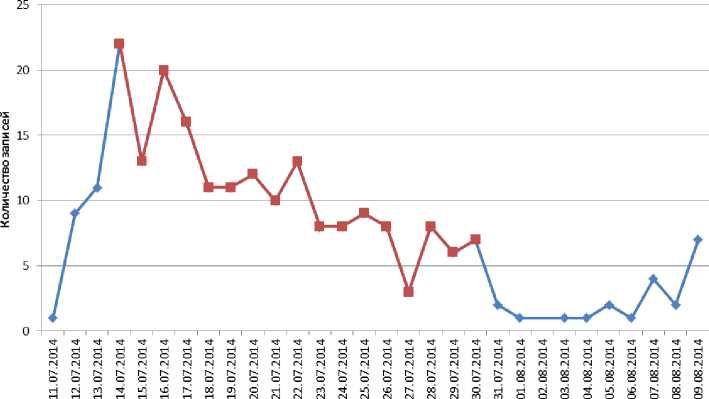
Рис. 11. Динамика записей в персональных блогах (не считая сообщений автора). Выделенный цветом период отвечает непосредственной продолжительности курса (14.07.2014 – 30.07.2014)
Отношение числа проанализированных блогов к общему числу записавшихся на курс (45 к 146) говорит о том, что далеко не все вели персональные блоги. Среди активных участников распределение по числу записей имеет вид т. н. «длинного хвоста» (см. Рисунок 12): максимум записей от участника равен 27, при этом число записей от среднего участника составляет 3 (медиана), и больше половины всех записей (56,8%) опубликованы 9 наиболее активными участниками. Распределение по комментариям выглядит аналогично (составлено для n = 54 участников, публиковавших комментарии в блогах): при максимуме 67 комментариев, число комментариев от среднего участника равно 4 (медиана), и больше половины всех комментариев (57,3%) опубликованы 8 наиболее активными участниками.
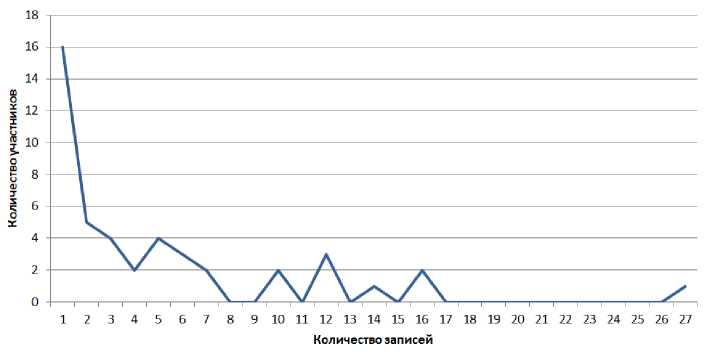
Рис. 12. Распределение участников по количеству записей в персональном блоге. Распределение составлено для участников, активных в блогах ( n = 45, не считая автора)
Данных из блогов позволили построить граф комментирования, изображенный на Рисунке 13. Обнаруженные связи указывают на тенденцию группового общения внутри сообщества однокурсников. С помощью программы визуализации Gephi были определены 6 кластеров (сообществ) внутри совокупного графа (использовался встроенный алгоритм «Modularity» с параметрами «randomize», «use weights» и «resolution = 0.1»). Полученные кластеры (см. Рисунок 14) связаны между собой, что подтверждает модель сети групп как внутренней структуры учебного сообщества МООК.
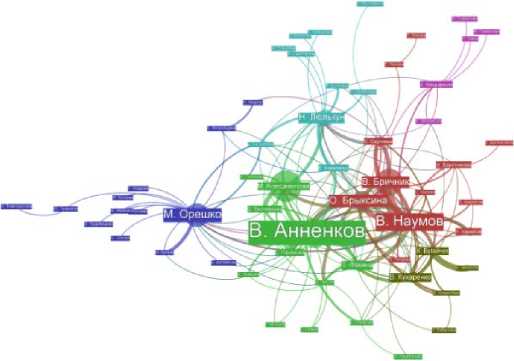
Рис. 13. Граф комментирования, полученный для участников, оставлявших комментарии в блогах однокурсников ( n = 54). Толщина связи пропорциональна количеству комментариев, написанных одним пользователем в персональном блоге другого. Величина узла (метки) пропорциональна его суммарной мощности (количество написанных + количество полученных комментариев)
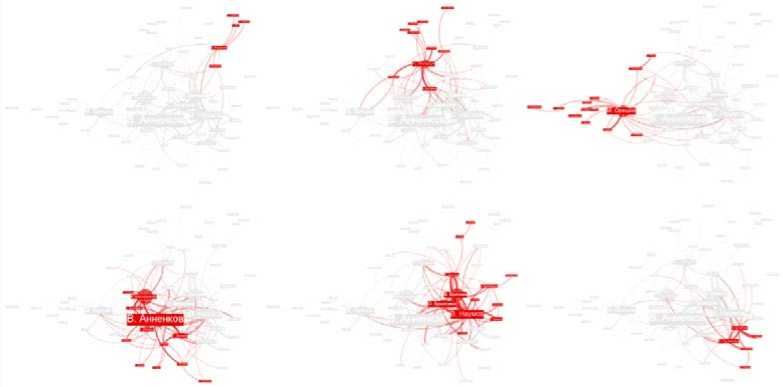
Рис. 14. Кластеры в графе комментирования (n = 6)
После окончания курса всем участникам была отправлена анонимная анкета, на которую откликнулись 18 человек. Результаты анализа вопроса об уровне участия показали, что ответы поступили от активных участников (см. Таблицу 3): 18 респондентов читали блоги однокурсников, 16 — вели собственные блоги, 15 — изучали материалы программы, 14 — комментировали записи в блогах однокурсников. Примечательно, что на вопросы о самом активном участнике и о тех, кто внес ощутимый вклад в понимание основных вопросов, в первую очередь (от 3 и более голосов) были названы участники из двух крупных кластеров с наибольшим числом связей.
Таблица 3.
Распределение респондентов анкеты по видам активностей.
|
Вид активности |
n |
|
чтение писем рассылки |
16 (89%) |
|
чтение блога курса |
17 (94%) |
|
чтение блогов однокурсников |
18 (100%) |
|
комментирование записей в блогах однокурсников |
14 (78%) |
|
ведение персонального блога |
16 (89%) |
|
публикация в социальных сетях |
8 (44%) |
|
использование дополнительных сервисов Веб 2.0 |
7 (39%) |
|
чтение материалов из программы |
15 (83%) |
|
поиск дополнительных материалов |
11 (61%) |
|
ведение конспектов и заметок на основе материалов (в любой |
12 (67%) |
|
форме) |
|
|
составление подборок интересных ссылок (в любой форме) |
10 (56%) |
Примечание: n = число респондентов, выбравших соответствующий вариант (допускался множественный выбор); всего респондентов: 18.
Анализ ответов на открытые вопросы показал следующее (см. Таблицу 4). На вопрос о трудностях, возникавших во время курса, респонденты назвали: нехватку времени (9 ответов); проблему самоорганизации (4 ответа); технические проблемы вроде низкой скорости доступа, затруднявшей просмотр докладов и участие в Skype- и видеовстречах (3 ответа); разнообразие точек зрения и отсутствие консенсуса (2 ответа); нехватку специальной теоретической подготовки (1 ответ); письменное формулирование мыслей (1 ответ); отсутствие конкретики в курсе (1 ответ). На вопрос о трудностях, возникавших у однокурсников (по мнению респондентов), были названы: нехватка времени (3 ответа); проблема самоорганизации (2 ответа); большой объем информации в курсе (1 ответа). На вопрос о способах преодоления трудностей респонденты назвали: оптимизацию личного времени (5 ответов); отказ от некоторых форм участия (4 ответа); избирательное чтение источников и блогов (3 ответа); выработку собственной точки зрения (1 ответ); постановку собственных задач (1 ответ); максимальное погружение, участие во всех формах работы (1 ответ).
Таблица 4.Результаты анализа открытых вопросов анкеты.
Трудности, возникшие у респондентовn
Нехватка времени9
Самоорганизация4
Технические проблемы (скорость доступа в Интернет и т. п.)3
Отсутствие консенсуса2
Нехватка специальной теоретической подготовки1
Письменное формулирование мыслей1
Отсутствие конкретики в курсе1
Трудности, возникшие у однокурсников по мнению респондентовn
Нехватка времени3
Самоорганизация2
Большой объем информации в курсе1
Способы преодоления трудностей респондентамиn
Оптимизация личного времени5
Отказ от некоторых форм участия4
Избирательное чтение (источники, блоги)3
Выработка собственной точки зрения1
Постановка собственных задач1
Максимальное погружение в курс (все формы участия)1
Примечание: n = частота соответствующих вариантов, установленных в ответах респондентов; всего респондентов: 18.
Среди замечаний (последний вопрос анкеты) отдельными респондентами были отмечены: польза ежедневной рассылки (стимулирующий эффект) и, одновременно, недостаток централизованной агрегации; отсутствие информации для новичков в МООК (методические рекомендации); нехватка ощутимых результатов и итоговой обобщающей встречи, а также недостаточное раскрытие проблематики.
Участие в дискуссии позволило автору непосредственно наблюдать, каким образом может происходить раскрытие и совместное осмысление предметного содержания в МООК. Этот процесс, направленный, как и предполагалось, на реконструкцию систематического изложения в предложенном программой контексте, происходит в форме реконцептуализации избираемых участниками вопросов на основе имеющегося и приобретаемого ими опыта. Реконцептуализация не в смысле подлинного переосмысления предмета, а в смысле повторного получения уже известных понятий, путем организации системы связей между данными источниками и новыми ресурсами, на основании которой они могут быть определены. Во время курса участники актуализируют личный опыт и пытаются интерпретировать его с позиции новых для них знаний и взглядов (в т. ч. опыта однокурсников). Рефлексия в общем дискуссионном пространстве направлена на уточнение понимания каждым активным участником и совместное доопределение программы МООК, выступающей таким образом в качестве динамичного контекста. В отличие от формального обучения, конечной целью здесь служит не столько репродукция некоего эталона знания, сколько адекватная (практичная) интеграция индивидуального понимания в контекст, определяемый принятой системой взглядов (источники, приглашенные эксперты). В вопросах, допускающих различные точки зрения (адекватные общим предпосылкам), разногласия могут сохранится, т. к. в МООК нет установки на консенсус. В таких случаях развитие одной точки зрения ведет к укреплению ее связей с другими на уровне аргументации, в результате чего и возникает распределенное между персональными ресурсами сетевое знание.
МООК как интеграция сетевых сообществ
МООК возникли как смелый эксперимент в контексте многолетней дискуссии о новых образовательных моделях в связи с распространением глобальной сети. Это произошло в тот момент, когда развитие Веб 2.0 кардинально упростило дистанционное сотрудничество, предоставив всем желающим инфраструктуру для создания сетевых сообществ. Наиболее опытные пользователи и исследователи начали создавать персональные среды и учебные сети, в результате чего выкристализовалась новая форма неформального дистанционного образования, задействовавшая экспертный ресурс сообществ, активных участников как генераторов знания и доступ к ООР. По сравнению со стихийным обучением в сетевых сообществах, МООК — это «организованное» обучение, сохраняющее гибкость и дух самоорганизации первого. Учащимся предоставлена значительная автономия, что является наиболее заметным отличием от традиционных академических курсов в виртуальной среде. Открытость МООК позволяет им не быть привязанными к конкретному сообществу по принципу внутренних корпоративных курсов, а, напротив, объединять участников различных сообществ.
МООК имеют два интересных преимущества перед традиционными академическим курсами, важные и привычные для участников сообществ:
-
• гибкость программы позволяет предлагать дополнительные ресурсы и формы сотрудничества. Участники могут использовать задач из профессиональной практики в качестве учебных, решая их во взаимодействии с однокурсниками. Эти задачи, если их связь с программой очевидна, и остальные участники также заинтересованы в решении, становятся важной практической составляющей курса. Предлагать задачи могут как эксперты, так и менее опытные участники. Последние и все, кто решает сотрудничать, помимо опыта приобретают статус эксперта, подтверждаемый качеством их личного вклада, авторизованного и зафиксированного в виртуальной среде;
-
• учебный процесс предполагает создание и публикацию содержания Веб 2.0 от имени учащихся. Новое содержание создается в процессе взаимодействия однокурсников, причем каждый публикуемый артефакт, будучи связан с другими, относится к персональным ресурсам и однозначно указывает на своего автора. При этом доступ к персональным ресурсам не связан с продолжительностью курса и зависит от решения их авторов: когда курс заканчивается, все или почти все результаты работы остаются доступны. В
дальнейшем участники могут использовать опубликованные ими материалы как часть личного портфолио.
С точки зрения сетевых сообществ, МООК служат внешним механизмом интеграции — интеграции не в смысле объединения, а в смысле возникновения перекрестных связей на всех уровнях: социальном, предметном и на уровне практики. Участие в МООК ведет к установлению новых контактов и потенциальному сотрудничеству в будущем, а непосредственное взаимодействие обнаруживает межпредметные связи, позволяет узнать и изучить практики из репертуара других сообществ. Конфигурация сети групп, возникающая из исходной совокупности однокурсников, проецируются на всевозможные сообщества, которым они принадлежат. Если наиболее активные участники, часто выполняющие функцию брокеров («мостиков») в сети групп, способны целенаправленно менять характер отношений между исходными сообществами, то влияние менее активных, например, в следствие перехода из одного сообщества в другое, будет непроизвольным. Новые ресурсы, которые производятся в процессе взаимодействия однокурсников, не просто характеризуют отношения внутри и между группами (публикуемые артефакты служат содержанием этих связей), связная совокупность этих ресурсов, коннективистское сетевое знание, — представляет собой межпредметный дискурс и экспертизу по вынесенным в программу вопросам. До тех пор, пока сами авторы (и только они) не решат ограничить доступ, каждый ресурс сетевого знания будет доступен из любых сообществ.
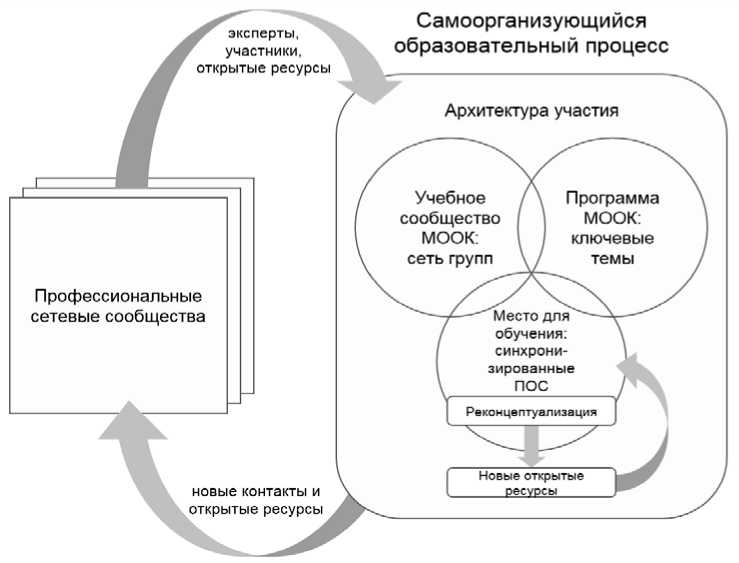
новые контакты и открытые ресурсы эксперты, участники, открытые ресурсы
Архитектура участия
Программа МООК: ключевые темы
Учебное сообщество МООК: сеть групп
Самоорганизующийся образовательный процесс
Профессиональные сетевые сообщества
'Место для обучения: синхронизированные ПОС
Новые открытые ресурсы
Реконцептуализация
Рис. 15. Самоорганизующийся образовательный процесс МООК как внешний механизм интеграции сетевых сообществ
На Рисунке 15 дано схематическое представление МООК как механизма интеграции сетевых сообществ. В основе схемы лежат инсайты, изложенные в предыдущих секциях. «Механизмом» автор называет самоорганизующийся образовательный процесс, описываемый в терминах архитектуры участия (основа организации и критерий активного участия), программы (предметный контекст, предоставляемый организатором и дополняемый участниками), учебного сообщества (социальная сеть участников), места для обучения (совокупность синхронизированных ПОС в качестве виртуальной образовательной среды) и реконцептуализации (получение ключевых понятий путем организации в текущем контексте системы определяющих их связей). Интеграция исходных сообществ происходит постепенно, по мере возникновения связей между однокурсниками и производимыми ими ресурсами и может продолжиться после окончания курса (как его «эхо»). Необходимым условием интеграции является наличие активных участников, делающих свою учебную траекторию прозрачной как для однокурсников, так и для коллег по сообществам.
Заключение
Анализ собственного опыта организации и участия в МООК с позиции процессов, происходящих во временном сообществе однокурсников, позволил автору установить связь между коннективистскими МООК и сетевыми профессиональными сообществами. Самоорганизующийся образовательный процесс как интеграция сообществ в рассмотренном выше смысле служит детализацией перехода от стихийного обучения к новаторскому формату коннективистского курса. Процесс, в результате которого возникает открытая сеть распределенных ресурсов, заключающая в себе межпредметный дискурс и экспертизу по избираемым вопросам, — крайне важная по мнению автора форма непрерывного образования. Интересно, что такие МООК тяготеют к семинарской форме обучения и в этом смысле ближе к классическому университетскому образованию, чем дистанционные курсы в духе профессионально-технической школы (сюда можно отнести большинство курсов Coursera, edX и аналогичные им).
Одно из актуальных направлений, относящееся к развитию исследовательской и образовательной деятельности вузов в виртуальной среде, автор видит в использования МООК для формирования новых сообществ по междисциплинарным проблемам. «Индуцируемые» коннективистскими курсами сообщества могли бы объединить ученых, педагогов и учащихся из вуза вместе с профессионалами-практиками и энтузиастами для реагирования на текущие и будущие вызовы (преодоление «сверхсложности»). В ближайшей перспективе это позволило бы интегрировать учебное сообщество вуза с сообществами профессионалов в общедоступных социальных сетях.
Наконец, важным направлением теоретическим работы является проблема навыков «опытного» участника. Высказанные сомнения насчет ее решения в рамках коннективизма намекают на дополнительные, возможно, более перспективные пути разработки дидактики МООК, в частности, на основе отечественной психологопедагогической мысли. Отправным пунктом здесь может стать выяснение роли отдельных групп опытных участников (мета-сообщество), переходящих из курса в курс, и, очевидно, связанных с «трансляцией» интересующих нас навыков.
Автор выражает благодарность всем «однокурсникам»: тем, кто был, и тем, кто не был назван явно. В чем-то наши мнения могут не совпадать, однако я многому у вас научился, и данная работа была бы невозможна без «гранта» вашего доверия. Также я благодарен моей коллеге и сестре Ю. Ю. Травкиной, бывшей на различных этапах как соорганизатором, так и участником моих экспериментов.
Список литературы Неформальное образование в интернет: от сетевых сообществ к массовым открытым онлайн-курсам
- Kop, R., Fournier, H., Sui Fai Mak, J. A Pedagogy of Abundance or a Pedagogy to Support Human Beings? Participant Support on Massive Open Online Courses //The International Review of Research in Open and Distributed Learning. -2011. -Т. 12, № 7. URL: http://www.irrodl.org/index.php/irrodl/article/view/1041/2025 (дата обращения: 24.01.2015).
- Barnett, R. Learning to work and working to learn //Supporting lifelong learning, Vol. 2: Organizing learning. London: RoutledgeFalmer, 2002. С. 7-20.
- Фрумина, Е.Л. Непрерывное образование для педагогов: модели и особенности //Непрерывное образование в политическом и экономическом контекстах/Отв. ред. Г.А. Ключарев. М.: ИС РАН, 2008. С. 274-292.
- Kop, R. The Unexpected Connection: Serendipity and Human Mediation in Networked Learning //Educational Technology & Society. -2012. -Т. 15, № 2. С. 2-11.
- Bouchard, P. Network Promises and Their Implications //The Impact of Social Networks on Teaching and Learning . Revista de Universidad y Sociedad del Conocimiento (RUSC). -2011. -Т. 8, № 1. С. 288-302. URL: http://rusc.uoc.edu/ojs/index.php/rusc/article/view/v8n1-bouchard/v8n1-bouchard-eng (дата обращения: 24.01.2015).
- Siemens, G. Massive Open Online Courses: Innovation in Education? //Open Educational Resources: Innovation, Research and Practice. Athabasca: UNESCO, 2013. URL: http://www.col.org/resources/publications/Pages/detail.aspx?PID=446 (дата обращения: 24.01.2015).
- Downes, S. The Role of Open Educational Resources in Personal Learning //Open Educational Resources: Innovation, Research and Practice. Athabasca: UNESCO, 2013. URL: http://www.col.org/resources/publications/Pages/detail.aspx?PID=446 (дата обращения: 24.01.2015).
- Daniel, J. Making Sense of MOOCs: Musings in a Maze of Myth, Paradox and Possibility //Journal of Interactive Media in Education. -2012. -Т. 18, № 3. URL: http://jime.open.ac.uk/article/view/2012-18/466 (дата обращения: 24.01.2015).
- Illich, I. Deschooling society . New York: Harper & Row, 1971.
- Андреев А. А. Российские открытые образовательные ресурсы и массовые открытые дистанционные курсы //Высшее образование в России. -2014. -№ 6. С. 150-155.
- Kennedy, J. Characteristics of massive open online courses (MOOCs): A review of research 2009-2012 //Journal of Interactive Online Learning. -2014. -Т. 13, № 1. URL: http://www.ncolr.org/issues/jiol/v13/n1/1 (дата обращения: 24.01.2015).
- Liyanagunawardena, T. R., Adams, A. A., Williams, S. A. MOOCs: A Systematic Study of the Published Literature 2008-2012 //The International Review of Research in Open and Distributed Learning. -2013. -Т. 14, № 3. URL: http://www.irrodl.org/index.php/irrodl/article/view/1455/2531 (дата обращения: 24.01.2015).
- Кухаренко В.Н. Инновации в e-learning: массовый открытый дистанционный курс //Высшее образование в России. -2011. -№ 10. С 93-99.
- Бугайчук, К.Л. Массовый открытый дистанционный курс: понятие, особенности проведения и перспективы использования в учебном процессе системы МВД //Информационные технологии и средства обучения. -2011. -Т. 26, № 6. URL: http://journal.iitta.gov.ua/index.php/itlt/article/view/551 (дата обращения: 24.01.2015).
- Бугайчук, К.Л. Массовые открытые дистанционные курсы: история, типология, перспективы //Высшее образование в России. -2013. -№ 3. С. 148-154.
- Проект резолюции ЮНЕСКО 35 C/DR.40 от 11 сентября 2009 г. . 2009. URL: http://unesdoc.unesco.org/images/0018/001839/183947r.pdf (дата обращения: 24.01.2015).
- Layte, M., Ravet, S. Rethinking quality for building a learning society //Handbook on quality and standardisation in E-learning. Berlin/Heidelberg: Springer, 2006. С. 347-365.
- de Waard, I., Keskin, N. O., & Koutropoulos, A. Exploring Future Seamless Learning Research Strands for Massive Open Online Courses //Handbook of Research on Emerging Priorities and Trends in Distance Education: Communication, Pedagogy, and Technology, 2014. URL: http://www.academia.edu/6854815/Exploring_Future_Seamless_Learning_Research_Strands_for_Massive_Open_Online_Courses (дата обращения: 24.01.2015).
- Патаракин, Е. Д. Открытая образовательная сеть как «паутина соучастия» //Высшее образование в России. -2011. -№ 10. С. 111-118
- Андреев, А. А. Общедоступные программные и образовательные ресурсы Интернета //Школьные технологии. -2010. -№ 1. С. 132-136.
- Андреев, А. А. Роль и проблемы преподавателя в среде e-Learning //Высшее образование в России. -2010. -№ 8/9. С. 41-45.
- Wilson, S., Liber, O., Johnson, M., Beauvoir, P., Sharples, P., Milligan, C. Personal Learning Environments: Challenging the dominant design of educational systems//Journal of e-Learning and Knowledge Society. -2007. -Т. 3, № 2. С. 27-38.
- Tua, C.-H., Blochera, M., Roberts, G. Constructs for Web 2.0 learning environments: a theatrical metaphor //Educational Media International. -2008. -Т. 45, № 4. С. 253-269.
- Cormier, D. Rhizomatic Education: Community as Curriculum //Dave's Educational Blog, 2008. URL: http://davecormier.com/edblog/2008/06/03/rhizomatic-education-community-as-curriculum/(дата обращения: 24.01.2015).
- Rita, K. The Design and Development of a Personal Learning Environment: Researching the Learning Experience //NRC Publications Archive (NPArC), 2010. URL: http://nparc.cisti-icist.nrc-cnrc.gc.ca/npsi/ctrl?action=rtdoc&an=15336786&lang=en (дата обращения: 24.01.2015).
- O'Reilly, T. The Architecture of Participation //O'Reilly Media, 2004. URL: http://oreilly.com/pub/a/oreilly/tim/articles/architecture_of_participation.html (дата обращения: 24.01.2015).
- Травкин, И. Ю. Архитектура участия //Fun of Teaching, 2012. URL: http://funofteaching.tumblr.com/post/28830345185 (дата обращения: 24.01.2015).
- Wenger, E., McDermott, R. A., Snyder, W. Cultivating Communities of Practice . Boston, MA: Harvard Business School Press, 2002.
- Lave, J, Wenger, E. Situated Learning: Legitimate Peripheral Participation . Cambridge: Cambridge University Press, 1991.
- Wenger, E. Communities of practice and social learning systems: the career of a concept //Social Learning Systems and communities of practice. Springer Verlag and the Open University, 2010. URL: http://wenger-trayner.com/wp-content/uploads/2012/01/09-10-27-CoPs-and-systems-v2.01.pdf (дата обращения: 24.01.2015).
- Lave, J., Wenger, E. Legitimate peripheral participation in communities of practice //Supporting lifelong learning, Vol. 1: Perspectives on learning. London: Routledge Falmer, 2002. С. 111-126.
- Kimble, C., Hildreth, P., Wright, P. Communities of Practice: Going Virtual //Knowledge Management and Business Model Innovation. Hershey, PA: Idea Group, 2001. С. 216-230.
- Wenger, E., White, N., Smith, J. D. Digital Habitats: stewarding technology for communities . Portland, OR: CPsquare, 2009.
- Wenger-Trayner, E., Wenger-Trayner, B. Introduction to communities of practice . URL: http://wenger-trayner.com/theory (дата обращения: 24.01.2015).
- Wenger, E. Communities of Practice. Learning, Meaning and Identity . Cambridge: CUP, 1998.
- Majewski, G., Usoro, A. Barriers of and incentives to knowledge sharing in (Virtual) Communities of Practice: A critical literature review //BU Academic Review. -2011. -Т. 10, № 1. С. 387-393.
- Carroll, F., Kop, R., Woodward, C. Sowing the seeds of learner autonomy: Transforming the VLE into a Third Place through the use of Web 2.0 tools //ECEL-European Conference on e-Learning. Cyprus: University of Cyprus, 2008. С. 152-159.
- Травкин, И.Ю. Мобильный кампус: коллективно-рефлексивное измерение учебной деятельности, опосредованной мобильными технологиями //Экономика, статистика и информатика. Вестник УМО. -2013. -№ 1. С. 15-20.
- Edwards, R., Usher, R. Globalisation and Pedagogy: Space, Place, and Identity . London, New York: Routledge, 2000.
- Kop, R. Using Social Media to Create a Place that Supports Communication //Emerging Technologies in Distance Education. Edmonton: AU Press, Athabasca University, 2010. С. 269-283.
- Wahlstedt, A., Pekkola, S., Niemelä, M. From e-learning space to e-learning place //British Journal of Education Technology. -2008. -Т. 39, № 6. С. 1020-1030.
- Bhargava, R. Manifesto For The Content Curator: The Next Big Social Media Job Of The Future? //Influential Marketing Blog, 2009. URL: http://www.rohitbhargava.com/2009/09/manifesto-for-the-content-curator-the-next-big-social-media-job-of-the-future-.html (дата обращения: 24.01.2015).
- Zhong, C., Shah, S., Sundaravadivelan, K., Sastry, N. Sharing the loves: Understanding the how and why of online content curation //Proc. 7th International AAAI Conference on Weblogs and Social Media, 2013. URL: http://www.inf.kcl.ac.uk/staff/nrs/pubs/icwsm13.pdf (дата обращения: 24.01.2015).
- Siemens, G. Knowing Knowledge . Lulu.com, 2006.
- Weinberger, D. Too Big to Know: Rethinking Knowledge Now That the Facts Aren’t the Facts, Experts Are Everywhere, and the Smartest Person in the Room Is the Room . New York: Basic Books, 2012.
- Robert Scoble On Online Curation (an online interview with Howard Rheingold) . 2011. URL: http://www.youtube.com/watch?v=WMn-cJHzF8A (дата обращения: 24.01.2015).
- Shirky, C. Talk about curation (an online interview with Steve Rosenbaum) . 2010. URL: http://curationnationvideo.magnify.net/video/Clay-Shirky-6 (дата обращения: 24.01.2015).
- Травкин, И. Ю. Неформальный контекст: три функции преподавателя //Fun of Teaching, 2012. URL: http://funofteaching.tumblr.com/post/27769757789 (дата обращения: 24.01.2015).
- Yeager, C., Hurley-Dasgupta, B., Bliss, C. A. cMOOCs and Global Learning: An Authentic Alternative //Journal of Asynchronous Learning Networks. -2013. -Т. 17, № 2. С. 133-147.
- McAuley, A., Stewart, B., Siemens, G., Cormier, D. The MOOC Model for Digital Practice . 2010. URL: http://www.elearnspace.org/Articles/MOOC_Final.pdf (дата обращения: 10.01.2015).
- Siemens, G. Connectivism: A Learning Theory for the Digital Age //International Journal of Instructional Technology and Distance Learning. -2005. -Т. 2, № 1. URL: http://www.itdl.org/Journal/Jan_05/article01.htm (дата обращения: 24.01.2015).
- Downes, S. An Introduction to Connective Knowledge //Stephen’s Web, 2005. URL: http://www.downes.ca/post/33034 (дата обращения: 10.01.2015).
- Полат, Е. С., Петров, А. Е., Теория коннективизма в зарубежной дидактике //Информатика и образование. -2008. -№ 11. С. 92-98.
- Сергеев, С. Ф. Коннективизм как педагогическая система: метафора сети//Школьные технологии, 2008. -№ 1. С. 44-48.
- Siemens, G. Sensemaking artifacts [Электронный ресурс] // Connectivism, 2011. URL: ttp://www.connectivism.ca/?p=336 (дата обращения: 10.01.2015).
- Downes, S. MOOC -The Resurgence of Community in Online Learning //Half an Hour, 2013. URL: http://halfanhour.blogspot.ru/2013/05/mooc-resurgence-of-community-in-online.html (дата обращения: 24.01.2015).
- Downes, S. What a MOOC Does -#Change11 //Half an Hour, 2012. URL: http://halfanhour.blogspot.ru/2012/03/what-mooc-does-change11.html (дата обращения: 24.01.2015).
- Талызина, Н. Ф. Управление процессом усвоения знаний . М.: МГУ, 1975.
- Siemens, G. Narratives of coherence: sensemaking and wayfinding in complex information ecologies . 2011. URL: http://www.slideshare.net/gsiemens/sensemaking-and-wayfinding (дата обращения: 24.01.2015).
- Clarà, M., Barberà, E. Learning online: massive open online courses (MOOCs), connectivism, and cultural psychology //Distance Education. -2013. -Т. 34, № 1. С. 129-136.
- Downes, S. A Personal Learning Framework . 2014. URL: http://www.youtube.com/watch?v=WYQzgeS-Dyk (дата обращения: 24.01.2015).
- Cormier, D. Success in MOOC . 2010. URL: http://www.youtube.com/watch?v=r8avYQ5ZqM0 (дата обращения: 24.01.2015).
- Руководство по Дизайну Курсов P2PU /P2PU.org (перевод: И. Ю. Травкин, Ю. Ю. Травкина), 2011. URL: http://ru.scribd.com/doc/53312689/(дата обращения: 24.01.2015).
- Corneli, J., Danoff, C. J. Paragogy: Synergizing individual and organizational learning . 2011. URL: http://upload.wikimedia.org/wikiversity/en/6/60/Paragogy-final.pdf (дата обращения: 24.01.2015).
- Herbert, M. Why All the Chatter About #EdChat? //District Administration, 2012. URL: http://www.districtadministration.com/article/why-all-chatter-about-edchat (дата обращения: 24.01.2015).

